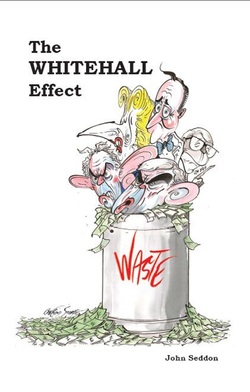The Whitehall Effect ~ John Seddon - Online Notes
|
Links below take you to the chapter notes:
Introduction 1. Prelude Part 1: The industrialisation of public services 2: Call centres 3. Back Offices 4. Shared Services 5. Outsourcing 6. Information Technology Part 2: Delivering services that work Introduction 7. A better philosophy 8. Effective change starts with ‘study’ 9. Better thinking, better design 10. ‘Locality’ working 11. IT as pull, not push Part 3: Things that make your head hurt 12. Targets and standards make performance worse 13. Inspection can’t improve performance 14. Regulation is a disease 15. It’s the system, not the people 16. Incentives always get you less Part 4: ideology, fashions and fads 17. Choice 18. Personal Budgets 19. Commissioning 20. Managing demand 21. Nudge 22. Procurement 23. Risk management 24. Lean 25. IT: features over benefits Part 5 Change must start in Whitehall 26. Beware economists bearing plausible ideas 27. Whitehall is incapable of doing evidence 28. Getting a focus on purpose |
14. Regulation is a disease
1] Speech by Martin Wheatley, Managing Director, Financial Services Authority, (later to be known as the Financial Conduct Authority) 5 September 2012, ‘The incentivisation of sales staff – are consumers getting a fair deal?’ View 2] Bob Rhodes and Richard Davis, 2014, ‘Regulation: The unintentional destruction of intentional communities’. View Simon Caulkin, 26 February 2014, ‘Social care: who needs enemies?’ View The Guardian, 30 July 2014, ‘Communities for learning disabled residents face split after reform row’ View 3] Robert Francis, 2013, The Mid Staffordshire NHS Foundation Trust Public Inquiry Report. View 4] Single-loop and double-loop learning were patterns first described by Chris Argyris and Donald Schön. Single-loop learning involves improving incrementally through learning new skills or capabilities, with managers perhaps learning to do something better but without challenging the underlying beliefs and assumptions behind their problems. Double-loop learning goes further than single-loop learning by reshaping the patterns of thinking and behaviour which govern why actions are taken. Double-loop learning is essential in the progression towards becoming a ‘learning organization’. See Chris Argyris, ‘Teaching smart people how to learn’, Harvard Business Review, May 1991. View 5] The Telegraph, 12 February 2013, ‘Jeremy Hunt: “Let’s cut nurses’ paperwork by a third”’. Byline: Stephen Adams. View 6] The Guardian, 6 February 2013, ‘David Cameron’s prescription for NHS failings: target pay of nurses’. Byline: Denis Campbell. View Sky News, 7 January 2012, ‘PM Wants Nurses To Check Patients Every Hour’. View 7] Jeremy Hunt MP, Speech to Reform Thinktank, 12 February 2013, ‘An NHS that treats people as individuals’. View |

